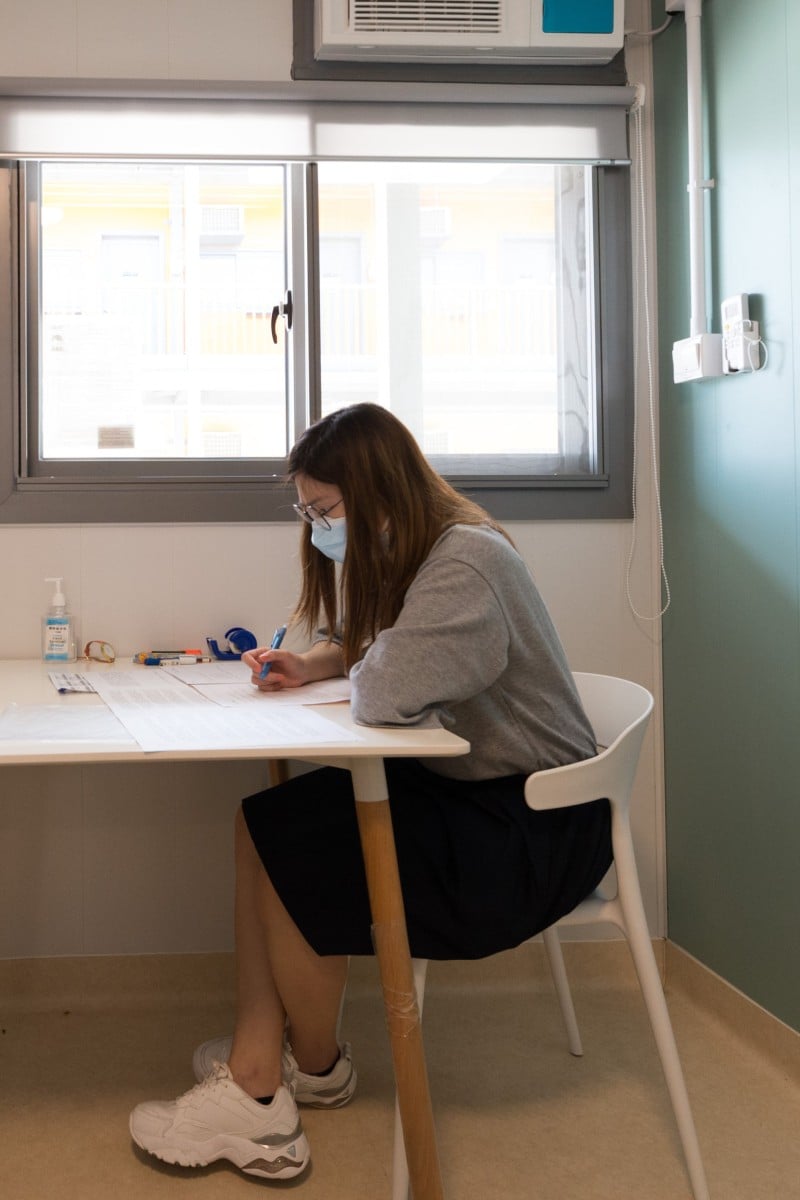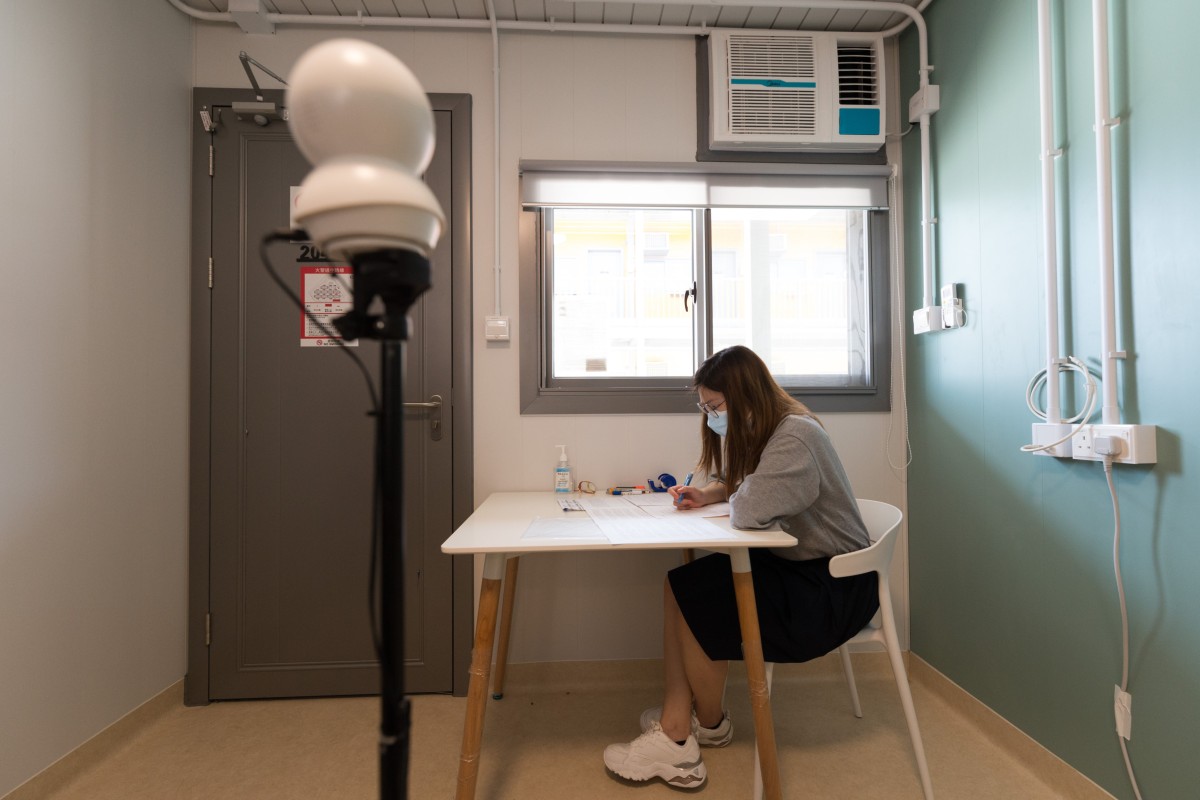
- If candidates for Hong Kong’s university entrance exam test positive for Covid-19 or are close contacts of a confirmed case, they can sit the test at the isolation centre
- A doctor advises students to monitor their health to decide whether they can take the exam or if they should ask for an assessment of their grade
 Students admitted to the isolation facility must stay for at least seven days, depending on their vaccination status. Photo: HKEAA
Students admitted to the isolation facility must stay for at least seven days, depending on their vaccination status. Photo: HKEAAAs the fifth day of the Hong Kong Diploma of Secondary Education (DSE) exam progresses, students have expressed concern about having to take the test at the Penny’s Bay isolation facility if they contract Covid-19 or are deemed close contacts of a confirmed case.
As of Wednesday, exam authorities said 26 DSE candidates, of whom 17 were infected, had been admitted to the quarantine camp on Lantau Island.
But even if you are exposed to Covid-19, there are still ways to stay in your best condition for the exam. Young Post spoke to a medical expert, a social worker and two educators for advice on how to power through your exams – and when to know when to ask for an assessed grade instead.
What you need to do, items to pack before heading to the 2022 DSE exams
Low risk of developing serious symptoms
As the vaccination rate among the city’s adolescents is relatively high, respiratory medicine specialist Dr Leung Chi-chiu reassures students that even if they are exposed to Covid-19, they are less likely to be seriously ill.
“Most infected students usually have no symptoms or are just mild cases. Their health condition should be able to handle the exam,” says Leung.
The doctor believes the special arrangement for Covid-19 DSE candidates at Penny’s Bay will reduce the risk of cross-infection, which could alleviate the stress they and their peers might feel.
In the special exam centre, each student is assigned two isolation units – one for sitting exams, the other for the remainder of their time in quarantine. The facility on Lantau Island can accommodate 1,000 DSE candidates.
Maintain a healthy routine
Getting enough water and food are key to keeping your body healthy, Leung stresses.
“Hunger and thirst affect the body, so [students] should maintain a normal diet,” he says.
At the isolation facility, students will have tap water to keep them hydrated and enough food to keep them satisfied, according to the Hong Kong Examinations and Assessment Authority (HKEAA).
Hong Kong government won’t relax restrictions earlier, Carrie Lam says
Infected candidates should exercise regularly and practise mindfulness to relieve stress, according to Esther Ho Yuk-fan, principal of Carmel Alison Lam Foundation Secondary School and chairwoman of the Hong Kong Association of Careers Masters and Guidance Masters.
“When students enter a new environment, they will inevitably feel anxious, and mindfulness is an effective tool for adjusting their mindset and boosting their mood,” she notes, suggesting students practise mindfulness a few times a day.
“Students could play some music by phone and meditate for five to 10 minutes. This can help increase their attention span and awareness.”
The school principal says 30 minutes of exercise every day can keep the brain active and make revision more effective. While in quarantine, students can do light stretches or follow at-home workouts from YouTube.
How journaling can help relieve stress and foster creativity
Keep contact with the outside world
Quarantined candidates at Penny’s Bay should talk to their family and friends if they feel lost or helpless, advises Reade Chan Hin-chung, a registered social worker at student support centre, Hok Yau Club.
Students admitted to the isolation facility must stay for at least seven days, depending on their vaccination status. It might be tough for them to live apart from their parents, as they will need to handle problems on their own, and it can be easy to feel stressed and lonely.
“If students ... feel lost while in quarantine, they can seek help from online counselling groups … If they are concerned about their studies, they can turn to teachers and friends for support,” says Chan, adding students should remember to bring a SIM card with plenty of data to communicate with the outside world.
Consider the silver lining
Ng Po-shing, a consultant at Hok Yau Club, suggests students try to focus on the positive aspects of staying at Penny’s Bay.
It will only add to their stress if students entering quarantine dwell on their worries about not being able to sit the exam, falling seriously ill, or having limited support.
“They can shift their focus to the benefits, such as being able to revise in a quiet space and saving time by not having to commute to the exam hall. These are all positive things that might help them get an even better grade,” Ng notes.
Why a study room in Hong Kong is free for students preparing for DSE exams
Ask for an assessed grade if you need to
When students are admitted to Penny’s Bay, Leung reminds them to keep an eye on how their bodies feel to decide whether they are capable of sitting the exam.
“If they develop new symptoms or feel themselves deteriorate – like having a high or persistent fever, blood oxygen level that drops below 94 per cent, or difficulties breathing – students should notify medical staff ... and seek help,” the doctor says.
Explainer: What you need to know about heading back to school
Chan advises infected students to monitor their symptoms and be prepared to ask for an assessed grade if needed.
“Even if students insist on taking the exam, the paper will not adjust its difficulty according to the students’ health. So opting for the assessed grade could be a safer choice, and students should consider this option,” says the social worker.
If candidates are too ill to sit the test, the HKEAA allows them to ask for an assessment of their exam grade. A student’s final grade in a subject will be based on their performance in school, as well as their classmates’ results in school and on the exam. Those given an assessed grade can get a maximum score of 5.
